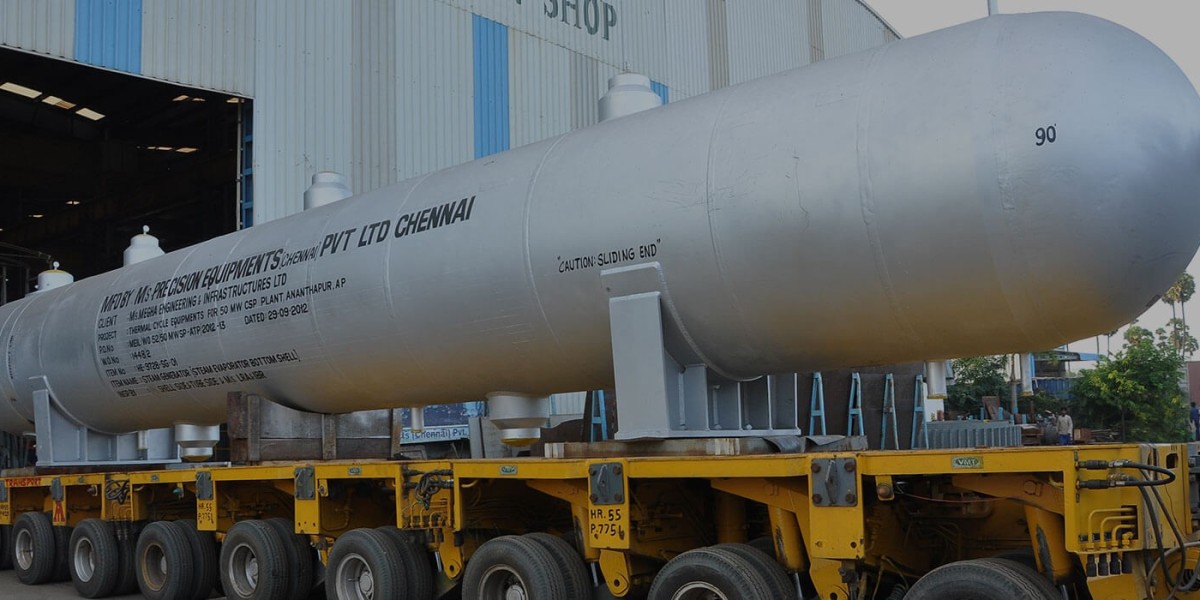In industrial applications, heat exchangers play a crucial role in efficiently transferring heat between different fluids without direct contact. Among the various types of heat exchangers, the Shell and Tube Heat Exchanger and Cryogenic Heat Exchanger stand out due to their versatility and effectiveness. Precision Equipment, a leading brand in the manufacturing of high-performance heat exchangers, provides advanced solutions catering to industries such as power generation, chemical processing, and cryogenics.
Shell and Tube Heat Exchanger: A Reliable Heat Transfer Solution
A Shell and Tube Heat Exchanger is one of the most commonly used heat exchangers in industrial applications. It consists of a series of tubes enclosed within a cylindrical shell. One fluid flows through the tubes, while another fluid flows over them within the shell, allowing efficient heat exchange.
Key Components of a Shell and Tube Heat Exchanger
Shell – The outer casing that holds the tube bundle and facilitates heat exchange.
Tubes – The primary medium where heat transfer takes place.
Tube Sheets – Secure the tubes in place within the exchanger.
Baffles – Direct fluid flow to enhance heat transfer efficiency.
End Caps or Heads – Provide an entry and exit point for the fluids.
Advantages of Shell and Tube Heat Exchangers
High Efficiency – Large surface area ensures effective heat transfer.
Durability – Made from robust materials that withstand high temperatures and pressures.
Easy Maintenance – Tubes can be cleaned or replaced individually.
Versatility – Suitable for a wide range of applications, including oil refineries, power plants, and chemical industries.
Applications of Shell and Tube Heat Exchangers
Petrochemical Industry – Used in crude oil refining and chemical processing.
Power Plants – Essential for cooling and heat recovery processes.
Food and Beverage Industry – Applied in pasteurization and sterilization.
HVAC Systems – Used in heating and cooling applications.
Cryogenic Heat Exchanger: Managing Extreme Cold Conditions
A Cryogenic Heat Exchanger is specifically designed to handle extremely low temperatures, making it an essential component in industries such as liquefied natural gas (LNG) production, space exploration, and superconductivity applications. These exchangers efficiently transfer heat at cryogenic temperatures, ensuring minimal energy loss.
How Cryogenic Heat Exchangers Work
Cryogenic heat exchangers operate under extremely low temperatures, often below -150°C, to facilitate the liquefaction and separation of gases. These heat exchangers are typically made from materials with excellent thermal conductivity, such as aluminum or stainless steel, to ensure efficient heat exchange.
Types of Cryogenic Heat Exchangers
Plate-Fin Heat Exchangers – Composed of thin metal plates stacked together, providing high thermal efficiency.
Brazed Aluminum Heat Exchangers – Compact design with enhanced heat transfer performance.
Shell and Tube Cryogenic Heat Exchangers – Ideal for large-scale cryogenic applications.
Benefits of Cryogenic Heat Exchangers
High Thermal Efficiency – Optimized for extremely low-temperature operations.
Compact and Lightweight – Occupies less space compared to traditional heat exchangers.
Minimal Energy Loss – Reduces operational costs by maintaining thermal efficiency.
Long Service Life – Constructed with durable materials to withstand harsh conditions.
Applications of Cryogenic Heat Exchangers
LNG Industry – Essential in gas liquefaction and storage processes.
Aerospace Industry – Used in spacecraft cooling and propulsion systems.
Medical Field – Applied in MRI machines and cryopreservation.
Hydrogen and Oxygen Production – Plays a key role in gas separation and storage.
Precision Equipment: Excellence in Heat Exchanger Manufacturing
Precision Equipment is a trusted name in the field of advanced heat exchanger technology. The company specializes in manufacturing Shell and Tube Heat Exchangers and Cryogenic Heat Exchangers designed to meet the highest industrial standards. Their products are known for superior efficiency, reliability, and cost-effectiveness, making them a preferred choice across multiple sectors.
Why Choose Precision Equipment?
Innovative Designs – Advanced engineering ensures maximum performance.
High-Quality Materials – Use of premium materials enhances durability and efficiency.
Customization Options – Tailored solutions to meet specific industrial needs.
Compliance with Industry Standards – Manufactured following global safety and quality regulations.
Conclusion
Shell and Tube Heat Exchangers and Cryogenic Heat Exchangers are vital for industrial processes requiring efficient heat transfer. With the expertise of Precision Equipment, industries can benefit from high-performance solutions tailored to their specific requirements. Whether for high-temperature applications or extreme cryogenic conditions, investing in the right heat exchanger ensures optimal efficiency and long-term reliability.



